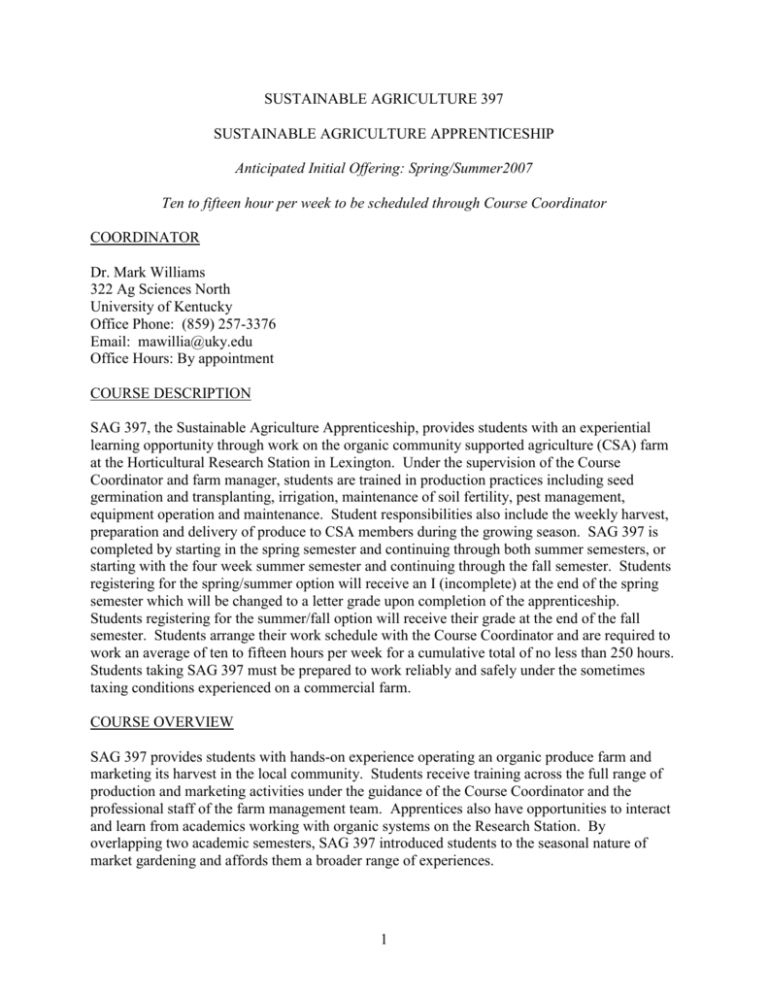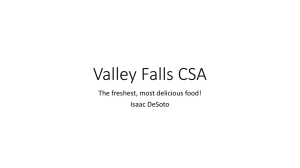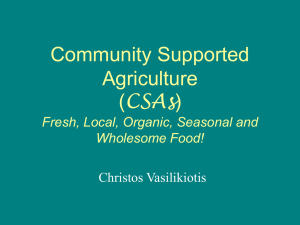GENERAL AGRICULTURE 109
advertisement

SUSTAINABLE AGRICULTURE 397 SUSTAINABLE AGRICULTURE APPRENTICESHIP Anticipated Initial Offering: Spring/Summer2007 Ten to fifteen hour per week to be scheduled through Course Coordinator COORDINATOR Dr. Mark Williams 322 Ag Sciences North University of Kentucky Office Phone: (859) 257-3376 Email: mawillia@uky.edu Office Hours: By appointment COURSE DESCRIPTION SAG 397, the Sustainable Agriculture Apprenticeship, provides students with an experiential learning opportunity through work on the organic community supported agriculture (CSA) farm at the Horticultural Research Station in Lexington. Under the supervision of the Course Coordinator and farm manager, students are trained in production practices including seed germination and transplanting, irrigation, maintenance of soil fertility, pest management, equipment operation and maintenance. Student responsibilities also include the weekly harvest, preparation and delivery of produce to CSA members during the growing season. SAG 397 is completed by starting in the spring semester and continuing through both summer semesters, or starting with the four week summer semester and continuing through the fall semester. Students registering for the spring/summer option will receive an I (incomplete) at the end of the spring semester which will be changed to a letter grade upon completion of the apprenticeship. Students registering for the summer/fall option will receive their grade at the end of the fall semester. Students arrange their work schedule with the Course Coordinator and are required to work an average of ten to fifteen hours per week for a cumulative total of no less than 250 hours. Students taking SAG 397 must be prepared to work reliably and safely under the sometimes taxing conditions experienced on a commercial farm. COURSE OVERVIEW SAG 397 provides students with hands-on experience operating an organic produce farm and marketing its harvest in the local community. Students receive training across the full range of production and marketing activities under the guidance of the Course Coordinator and the professional staff of the farm management team. Apprentices also have opportunities to interact and learn from academics working with organic systems on the Research Station. By overlapping two academic semesters, SAG 397 introduced students to the seasonal nature of market gardening and affords them a broader range of experiences. 1 LEARNING OBJECTIVES Upon completion of this course, students should be able to: ~ Perform the fundamental management practices needed to establish and maintain a small-scale organic produce production system including seedling establishment, fertility management, pest control, harvest, and equipment operation and maintenance. ~ Understand how the CSA model functions and gain direct marketing experience by participating in the weekly delivery of shares to CSA members. ~ Serve as a responsible and productive member of a work crew that sets goals, shares responsibilities, coordinates activities, follows through on commitments, and meets objectives. ~ Express in written and oral form the technical knowledge and personal insight gleaned during the apprenticeship experience. ~ Convey a working knowledge of the organic produce production and the certification process and identify significant management issues for converting a conventional management system to a certified one. PERFORMANCE EVALUATION There is no final examination in this course. Grades are determined on a cumulative scale of 100 points calculated as follows: Evaluation by Course Coordinator End of semester oral semester presentation Work journal 60 points 20 points 20 points There is no final examination in this course. The general letter grade assignments will be as follows: > 90 points 80-89 70-79 61-70 A B C D Evaluation by Course Coordinator. The Course Coordinator in consultation with members of the farm staff will assess each student’s contribution to the CSA’s learning environment and operational success. Criteria include dedication to work assignments, commitment to achieving group objectives, positive interaction with fellow apprentices, farm staff and CSA members, and demonstration of technical prowess. 2 End of semester oral presentation. Each student will develop and deliver an original oral presentation based on their apprenticeship experience to a gathering of peers and farm staff. The presentation may address specific subjects related to production and marketing, such as a review of current research on conservation tillage or CSA management. Students may also elect to develop more personal presentations that covey intellectual, philosophical, or aesthetic insight derived from their apprenticeship experience. Presentations are expected to last between fifteen and twenty minutes and students should receive prior approval of their topic from the Course Coordinator. Work log and journal. Students spend the last fifteen minutes of each work shift composing a personal work log and journal. Students are required to record the tasks that they undertook and completed during the shift and characterize pertinent environmental conditions such as the lack or abundance of precipitation, level of pest pressure, or status of crop maturity. On days when students deliver produce to CSA members, they will identify the share contents and discuss their interactions with CSA members. Work journal and log entries are meant to be personal and informal, and afford apprentices the opportunity to reflect upon their individual contribution to the successful operation of the farm. Farm staff will periodically review the work log and journal during the apprenticeship and provide feedback. COURSE POLICIES Scheduling and fulfilling work shifts. The successful operation of the CSA depends upon the consistent and reliable productivity of the apprentices who work there. Students are responsible for arranging a suitable shift schedule with the farm managers at the beginning of the semester. In agreeing to this schedule, students commit to being an integral part of the work team. Being on time, prepared to work and task oriented is essential for the apprentice to maximize their achievement and performance evaluation in this course. No form of plagiarism or cheating will be tolerated. The University of Kentucky maintains that any student committing such offenses must receive a 0/E for the assignment. The University reserves the right to levy additional punishment, including possible expulsion from the university. Specific procedures related to cheating/plagiarism can be found in your copy of the Student Rights and Responsibilities booklet. Disability. If you have a disability that requires special accommodation during class or for completion of assignments, please tell the instructors at the beginning of the semester. Support for students. We are looking forward to a constructive, interactive learning environment. If you are having problems with the course, please come see the instructors sooner, rather than later. If you cannot come during scheduled office hours, email to make an appointment. Feel free to talk to us about your problems and we’ll do our best to correct them. 3






